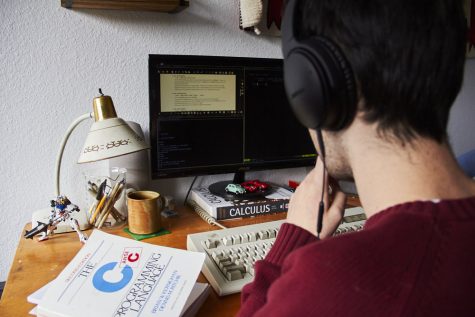Functionality of online lab classes
STEM students share the positives and negatives of online learning
May 14, 2020

With the middle of spring quarter approaching, sophomore applied human biology major Pam Styborski mourns the bustling environment and friendly faces of her friends and colleagues on the Seattle Pacific University campus.
With the school’s current online format, SPU’s Science, Technology, Engineering and Math (STEM) students may be facing some of the biggest losses this quarter.
Despite the lack of lab and classroom resources, professors are working closely with students to ensure that they have the most effective learning experience possible. Although professors have done their best to provide these resources, STEM students still face challenges studying at home during a worldwide pandemic.
Completing lab classes in an online format comes with many frustrations, according to Styborski. She shared that her biology class in particular has plagued her with difficulties.
“Online labs are a lot more challenging because we don’t have a TA [Teaching Assistant] or lab partner … [as a resource] my professor set up online lab groups for us, so things are slowly becoming easier,” Styborski said in an interview via Zoom.
Sophomore and computer science major Abigail Joppa shared Styborski’s frustration, adding that she faces many difficulties while completing online work for her biology class.
“There isn’t a lot of hands on work we can do, so oftentimes the class is cut short … I’m glad that biology is not my intended focus because it has been a lot harder to learn outside the classroom as opposed to in a lab,” Joppa said in a Zoom interview.
Although they are both STEM students, Styborski and Joppa are studying vastly different topics. While Styborski’s focus is in human biology, Joppa’s studies include website development and the electrical anatomy of computers.
“I think it’s been a learning curve for all of us and, as time has gone on, it has definitely gotten better,” Joppa said of learning online.
Because it is difficult to understand how labs work in the online format, Styborski said she is able to get the clarification she needs during office hours via Zoom.
“I miss being able to meet in person, but I’m glad we’re still able to communicate with our professors and get the help that we need,” she said.
Similar to Styborski, Joppa misses the camaraderie and collaboration between students. For her, it is difficult being away from her friends and peers.
“I really miss running into kids in Otto [Miller Hall]. There isn’t as much face to face time,” she said.
Without access to a lab, Styborski shared that her professors have altered the curriculum to better accommodate the students and their workload.
“A lot of our work has been adjusted so that we can complete the procedures with household items,” Styborksi said.
Styborski explained that in a recent lab for inorganic chemistry, the students used items such as vinegar, pennies, and aluminium foil to recreate electrolytic cells. She added that her professor took a survey at the beginning of the quarter in order to gage what materials students have accessible to them.
Joppa, on the other hand, explained that the format of her coursework and study habits have not drastically changed since the transition to online.
“Being a computer science major, I already understand how to set up my software … coding often requires a lot of self-teaching so I haven’t had many issues so far,” Joppa said.
Styborski added that her professors will also ask students to walk them through the steps of a lab.
Styborski shared that although they are not physically conducting the lab, talking through the process has been beneficial in understanding how different procedures work.
“Because my chem professor has the proper materials to complete our procedures, he asks us to walk him through it so we also have the opportunity to learn that way,” Styborski said.
Styborski noted that her professors have done a commendable job at keeping students on track and holding them accountable for completing their work. Everything works on an efficient schedule.
“In my chem class for example, we have quizzes embedded in our lectures with specific due dates, so we have to complete them within the time frame, and that has helped me keep better track of my work,” Styborski said.
Styborski also explained that her professors have taken the time to get to know students personally. She shared that they are taking any opportunity to check in with students, whether during Zoom office hours or during lectures to make sure students are doing well with their classes and in their personal lives.
“This [fourth week of the quarter] is the first week where it feels like I’m really getting the hang of everything … I’m really glad that my professors are understanding,” Styborski said.
“Classes have definitely been different online as compared to in-person but I think I’m finally getting the hang of it and I have hope for the rest of the quarter.”


























































































